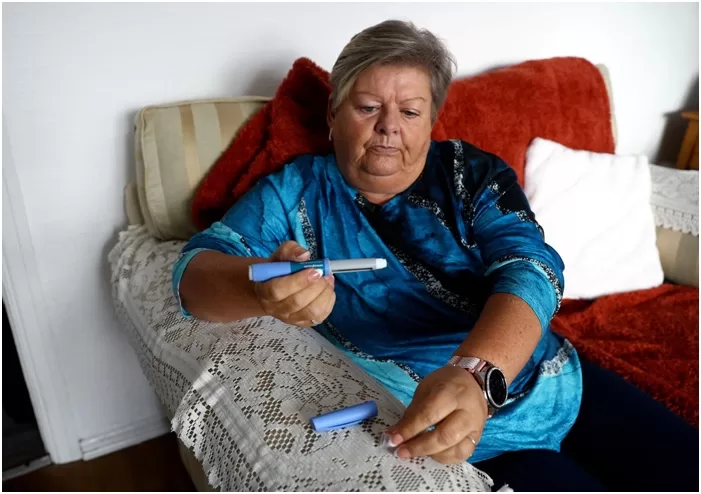Health
2023 Weight-Loss Drug Trends: Challenges & Opportunities in 2024

Highlights
- Powerful GLP-1 agonists like Wegovy gained attention in 2023 for addressing record obesity rates.
- High demand and prices create accessibility challenges for potential beneficiaries in 2024.
- GLP-1 agonists mimic a hormone, aiding weight loss; clinical trials report 15-20% body weight reduction.
- Novo Nordisk faces Wegovy shortages, limiting availability to the world’s wealthiest countries.
- Rivals Eli Lilly and AstraZeneca enter the market, forecasting a $100 billion industry by the next decade.
- Concerns arise about potential inequalities, as U.S. prices surpass $1,000 per month, impacting coverage.
- Private insurers and delays raise questions about accessibility, especially for marginalized groups.
- Experts stress the need for comprehensive obesity treatment, including counselling and older, cheaper medications.
- Addressing concerns about medication affordability and long-term use for sustained weight loss.
- Ongoing research is needed to identify patients who truly benefit, minimizing unnecessary drug usage.
- Beyond weight impact, the ultimate goal is enhancing the overall well-being of individuals.
As we step into 2024, the landscape of weight-loss medications, particularly GLP-1 agonists, remains dynamic, reflecting a transformative year in 2023. This year saw the emergence of powerful drugs like Wegovy from Novo Nordisk, capturing public attention through various channels, from social media to doctors’ offices and even cocktail parties. These drugs promised a new approach to combat the rising wave of obesity.
However, as we look ahead, significant challenges loom on the horizon. The extraordinary demand and elevated prices of these weight-loss medications may inadvertently limit access for many potential beneficiaries in the coming year. Let’s delve into the key facets shaping this narrative.
The Rise of GLP-1 Agonists
GLP-1 agonists, designed to mimic the activity of a hormone that curbs digestion and induces a feeling of fullness, showcased promising outcomes in clinical trials. Individuals enrolled in these trials experienced weight reductions ranging from 15% to 20%, contingent on the specific drug used. With nearly 120 million American adults eligible for treatment, the global target market for Novo Nordisk extends to over 760 million people grappling with obesity.
Supply and Demand Challenges
Novo Nordisk’s Wegovy, a frontrunner in this category, faced hurdles in meeting the overwhelming demand. Consequently, it is exclusively available in a select few of the world’s wealthiest nations. This supply strain led many individuals to turn to Novo’s diabetes medicine, Ozempic, compounding the challenges by causing shortages of Ozempic and introducing new insurance complexities for diabetic patients.
Market Expansion and Competition
Amidst these challenges, pharmaceutical giants like Eli Lilly and AstraZeneca entered the weight-loss drug market, anticipating a future worth $100 billion within the next decade. These companies are exploring versions of GLP-1 agonists that offer greater convenience with fewer side effects.
Affordability and Inequality Concerns
The potential benefits of drugs like Wegovy are transformative, especially for individuals whose weight poses significant health risks. However, the exorbitant costs, with U.S. prices exceeding $1,000 per month, raise concerns about accessibility. Private health insurers, facing pressure to cover these medications, are finding ways to delay or deny their use. This has led to worries about disparities, with potential difficulties for Black, Asian, and Hispanic patients relying on government health plans.
A Call for Comprehensive Obesity Treatment
The weight-loss drug landscape underscores the need for a comprehensive approach to obesity treatment. Physicians are encouraged to consider a range of tools, from counseling to older, more affordable medications that, while offering a smaller percentage of weight loss, still provide essential health benefits.
Balancing Medication Usage
With up to 40% of people with obesity estimated not to have other serious health risks, there’s a growing consensus that these medications should be selectively prescribed. The ultimate goal is to impact not only weight but also the overall well-being of individuals.
As we step into 2024, the weight-loss drug trends prompt critical questions for healthcare professionals, policymakers, and individuals alike. Balancing the transformative potential of these medications with concerns about accessibility, affordability, and long-term usage will be crucial in shaping a healthier future.




















































